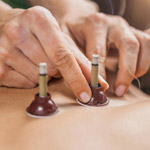
Moxibustion
Moxibustion is a traditional Chinese medicine (TCM) technique that includes burning dried mugwort, an Artemisia herb, on or around specific points on the body. The heat from the burning mugwort is believed to stimulate the flow of qi (energy) and blood, which can help to relieve pain, reduce inflammation, and improve overall health. Moxibustion is generally considered safe when performed by a qualified practitioner. But there are specific adverse results, like getting burned, scarred, or allergic. Before you try moxibustion, you should talk to your doctor, especially if you are pregnant or already have a health problem.


